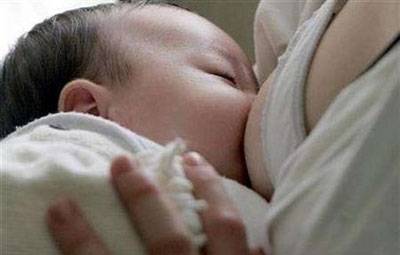Breast-feeding in the first three months of life appears to help shield children from developing food allergies.
That's just one of a number of findings on food allergies scheduled to be presented this week at the annual meeting of the American College of Allergy, Asthma and Immunology in Dallas.
Research has determined a possible role for food allergy prevention strategies in high-risk children, including maternal food avoidance in pregnancy, breast-feeding, maternal food avoidance while breast-feeding, use of hypoallergenic formulas, delayed introduction of allergenic foods and probiotics, noted one expert.
A woman breastfeeds her baby in a 2006 (file photo: agencies via China Daily)
"A review of 18 studies demonstrates a significant protective effect of exclusive breast-feeding for at least three months for children with high risk for atopy (genetic tendency to develop allergic diseases) against the development of atopic dermatitis and early childhood asthma-like symptoms," Dr. Robert Wood, international health director for pediatric allergy and immunology at Johns Hopkins School of Medicine, said in a prepared statement.
He offered a number of recommendations for children at high risk of allergic diseases:
-Women should avoid peanuts and tree nuts during pregnancy and while breast-feeding.
-Mothers should supplement breast-feeding with a hypoallergenic formula (extensively or partially hydrolyzed).
-Delay feeding these children solid foods until they're six months old.
-Delay introduction of milk and egg until age 1 and peanut and tree nuts until age 3.
-Start early intervention when signs of food allergy appear (secondary prevention).
In a planned presentation about allergies and dietary restrictions, another expert noted that a person may have an allergy to one member of a food family, but may be able to eat other members of the same food family.
For example, one study on nine common fish found cross-reactivity and allergenicity were highest among cod, salmon and pollack and lowest among halibut, flounder, tuna and mackerel. Another study on edible nuts found cross-reactivity was strong among walnut, pecan and hazelnut; moderate among cashew, pistachio, Brazil nut and almond; and extremely low between peanut and tree nuts.
"You may be allergic to a particular part of a food, but not to another part," Dr. Sami Bahna, chief of allergy and immunology at Louisiana State University in Shreveport, said in a prepared statement.
Another expert said doctors need to consider food allergy as a potential cause of gastrointestinal or dermatological symptoms in patients.
"The eosinophilic gastrointestinal disorders (EGID) which may affect the esophagus, stomach, colon and rectum are mostly chronic and recurrent disorders that adversely impact quality of life for patients and families," Dr. Amal Assa'ad, director of the Food Allergy & Eosinophilic Disorders Clinic at Cincinnati Children's Medical Center, said in a prepared statement.
"Patients with EGID have a high rate of sensitization to food and environmental allergens, and many of them have a high rate of clinical symptoms with various food ingestions. A subset of patients respond to removal of major food allergens from their diet," Assa'ad said.
"EGID management often requires multiple specialists, including the primary physician, allergy and immunology, gastroenterology, nutrition and psychology," she noted.
(Agencies via China Daily November 15, 2007)


